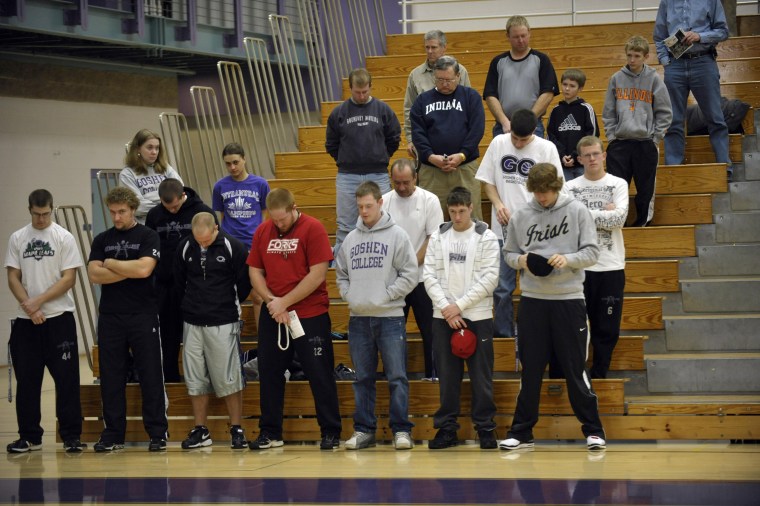For more than a century, there was no playing of "The Star-Spangled Banner" at Goshen College — a small Christian college with ties to the Mennonite Church.
That's about to change. For the first time in the school's history, Goshen College will play an instrumental version of the national anthem before many campus sporting events.
The decision to reverse the ban on the anthem is aimed at making students and visitors outside the faith feel more welcome, but it has roiled some at the 1,000-student college who feel the song undermines the church's pacifist message and puts love for county above love for God.
Since college President Jim Brenneman announced the decision in January, about 900 people have joined the Facebook group "Against Goshen College Playing National Anthem," hundreds have signed an online petition protesting the move and letters sent to administrators and the campus newspaper have overwhelmingly voiced opposition to the change.
Not everyone agrees
"We're very aware that not everyone on our campus that's part of this community shares the same views," said college spokeswoman Jodi Beyeler. "We believe that everyone here should feel like this is home."
John Roth, a Goshen College history professor, said Mennonites have historically avoided the song because its lyrics describe using war and military might to defend the country.
"The link between the national anthem and the military identity of the nation is made very explicit," Roth said.
Mennonites, whose church is rooted in a 16th-century movement in Europe known as Anabaptism, also believe singing a "hymn of allegiance" like the national anthem implies a deeper loyalty to country rather than to God, Roth said. However, Mennonite Church USA — which represents the largest and most mainstream group of Mennonites in the U.S. — does not specifically prohibit the anthem.
Goshen College officials say discussions about whether to change the policy began in September 2008 when the athletic department asked Brenneman to reconsider the school's stance. Brenneman said the teams often bore the brunt of criticism about the policy because the anthem's absence is most visible at sporting events, where it has become part of American culture.
Two months later, a parent from a visiting team game complained to the athletics director when the anthem wasn't played, said Vice President for Student Life Bill Born. Her complaint caught the attention of conservative talk show host Mike Gallagher, who featured the issue on his show. More than 300 people called or sent e-mails to the school, most urging the school to change its policy.
Beyeler said the choice to lift the ban had nothing to do with the national attention generated by Gallagher's show and stemmed instead from the work of a task force assembled last spring. The group recommended playing an instrumental version of the song, followed by a prayer.
The college approved the change, effective with the spring sports season that begins next month. It plans to review its policy again in June 2011.
'Not offending anybody'
Brenneman said he thinks the athletic teams are relieved by the decision.
"Sometimes they've been about the only ones who have been on the front lines of this to defend this position. I think we all recognize that that hasn't necessarily been fair to them," he said.
Freshman baseball player Mike Milligan, a Catholic, says students and athletes can choose how much they want to participate. About 45 percent of Goshen students are not Mennonite.
"I don't think that everyone has to show their respect, but we need to at least have the choice to show our respect," said Milligan, who started a Facebook group in favor of the decision. It has more than 200 members.
Some students said choosing an instrumental version of the anthem was a good compromise.
"You're not offending anybody, and everybody kind of gets a little of what they want," said junior Sabrina Swain.
But Allen Shenk, a senior music major who is Mennonite, isn't sure that solves the issue.
"It's a good compromise in the sense that it doesn't specifically mentioned the bombs bursting in air," he said. "But everybody listening is going to be thinking those words to themselves anyway, so is it really helping that much?"
